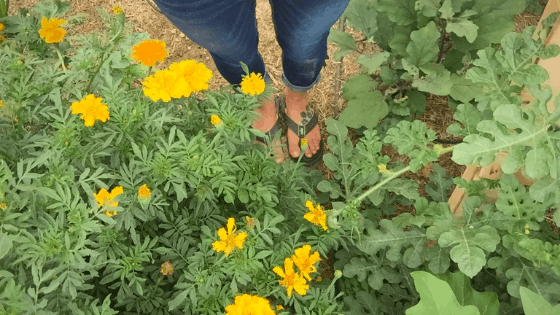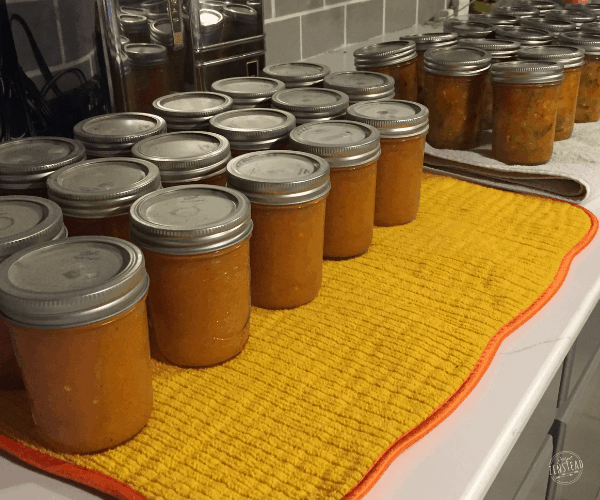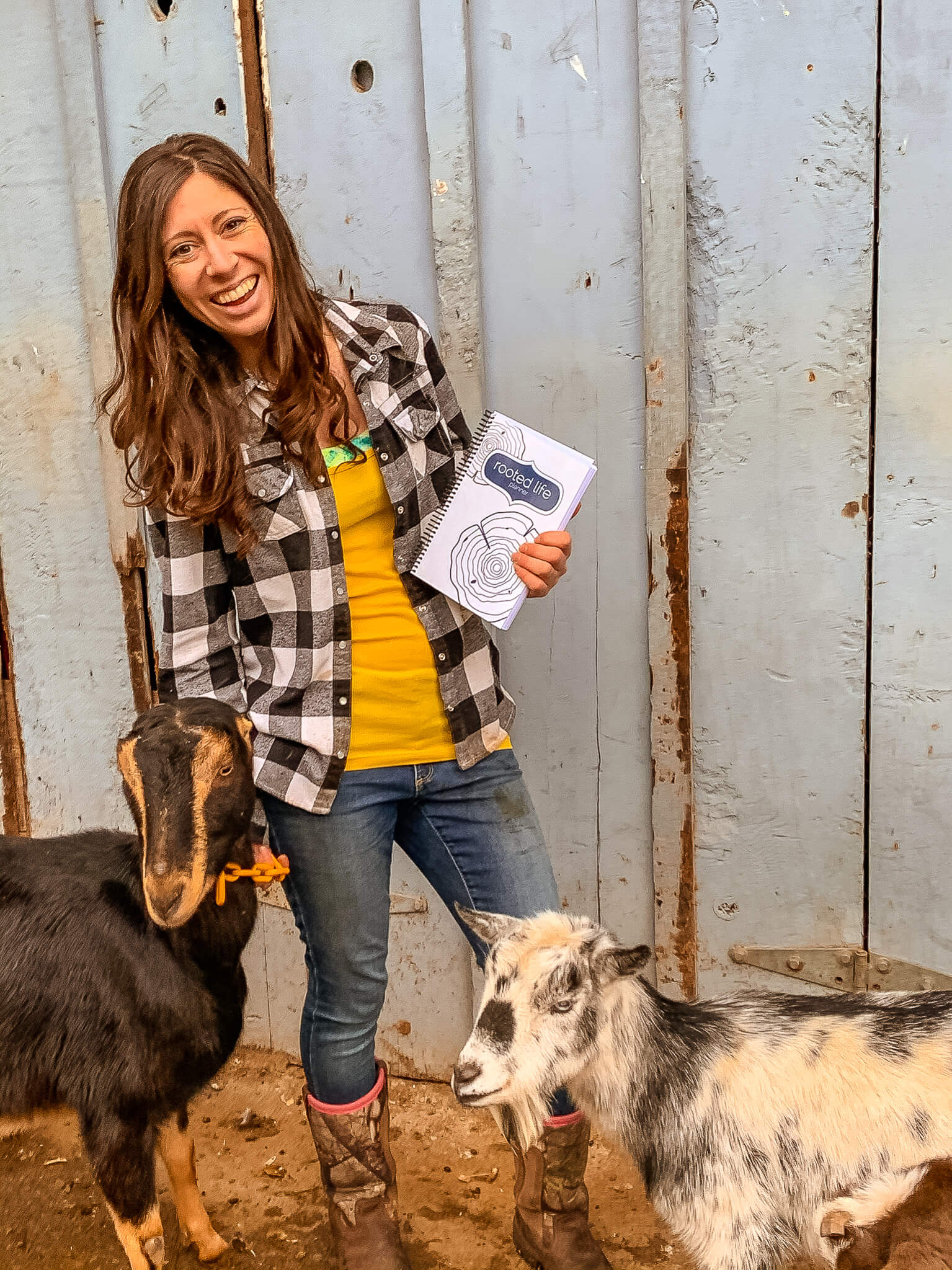Behind the Scenes: July 2019 – A quick recap of some of the homestead happenings that occurred this month, including: summer homestead maintenance, preserving the apricot harvest and our experience raising our first batch of meat chickens!
Summer is an interesting time on the homestead. You plan and wait for it all year. And then, it suddenly hits in full force! We’ve been up to our elbows in produce that needs processed, weeds that need pulled, plants that need watering, and every other imaginable chore! It’s such a gratifying and exhausting time of year! I’m always exhilarated when it starts and exhausted by the time it ends! And July was no exception to this!
**This post contains affiliate links. We may receive a commission at no expense to you if you choose to sign up for services using these links. See our full affiliate disclosure here. Thanks for helping support this blog! **
Summer Homestead Maintenance:
We’ve been lucky this year with some nice summer temperatures, but July ended with near 100 degree temps each day. Our “stay cool without air conditioning” routine of opening and closing windows has been in full swing! If you want more details, here’s exactly how we stay cool without air conditioning.
Weeding:
Our main homestead maintenance during the summer revolves around the garden. And pulling weeds. I pull a lot of weeds during the summer. I’m really starting to believe that I need to throw a party for some friends so they can come over and drink wine and help me weed the garden. I was thinking of calling it a “wine and weed” party, but people might get the wrong idea. ??♀️
In all seriousness, weeding is extremely time consuming during the summer. We use a variety of methods to naturally maintain weeds, but hand pulling is my go-to. It’s the safest easiest way, even if it is time-consuming. Spending entire weekends pulling weeds might not be glamorous, but it does give me a very real sense of accomplishment… until they grow back! ?
Watering:
Watering is another time-consuming but necessary chore during the summer. Keeping things watered in the high desert isn’t easy! Mulch is one of our best allies for our garden beds, but we still have to water regularly. Our pasture (about 1/4 acre) is hand watered with sprinklers since we don’t have irrigation rights. But to be honest, our pasture is really dried out this year. ? It’s very hard to get enough water on it using sprinklers. Hopefully next year, we can find a better alternative.
Luckily, we have made huge progress with the watering system in our garden. We finished installing the new drip lines in all of our raised beds last month, and they have been a life saver! We still have to hook the hose up to each of drip lines and move the hose from bed to bed. Since they are slow drip, we water about three times a week for 30 – 45 minutes for each raised garden bed. That means it takes about 8.5 hours to fully water all the garden beds! But at least I’m not doing it by hand! In July, I finally finished the drip lines for the “Magic Garden” (our perennial herb garden). These lines are hooked directly to our sprinkler system, so we are able to have them run automatically early in the morning.
10 Million Uses for Apricots:
Every year, our apricot tree loses its freaking mind and grows an absurd amount of apricots. You see, this is no cute little apricot tree. This thing is GIANT. It’s actually two non-hybridized trees that grew together. And for about 3 weeks each July, our house, cars, driveway, yard, and the occasional chicken are subjected to being slimed by the falling fruit. It actually gets quite disgusting and we spend the remainder of the year de-sliming everything. In fact, our first impression of this poor house was the overwhelming smell of rotting apricots!
Despite the mass slime that the apricots cause, I’m actually overwhelming grateful for the giant tree. It shades almost all of the chicken yard and provides a beautiful shelter for them. The cats take naps in it. And it’s a beautiful sight out the kitchen window when it blooms each spring.
And, of course, it provides us with more delicious organic apricots than we could ever consume by ourselves! We share with everyone we know, but we still have more than we are able to pick and use. It’s been quite the fun to challenge to find new and creative ways to maximize our use of the fruit each year!
This year’s apricot harvest provided us with:
- Frozen Apricots: This is our go-to use of the apricots! We never need to buy fruit for our smoothies because we have enough frozen apricots to feed a small nation! I can only imagine how much money we save on frozen fruit – and we know that it’s grown without the use any agrochemicals! Here’s exactly how we freeze and store our apricots!
- Apricot Salsa: This was a new venture this year and oh my goodness – it’s a new level of delicious! I’ve actually been asked by a couple people if I’m going to start selling it because they love it so much! Maybe we will in the future, but this year, we will just be sharing this goodness with family and friends! If you are interested in making your own, I used the recipe for Peach-Chili Salsa from the Ball Blue Book
and substituted peaches with apricots.

- Apricot Sorbet: Sorbets are quintessential summer food in our house! You simply blend up some fruit (frozen or fresh) with a little honey (and milk if needed to thin it out). Then you pop it in the freezer until it’s chilled! Viola! Healthy, refreshing dessert in a hurry!
- Apricot Fruit Leather: Fruit leathers are another easy snack to make! Simply blend up the fruit in your food processor. You can add a little honey if you want to sweeten it. Line your food dehydrator trays with parchment paper or use the fruit leather trays designed to fit your dehydrator. Pour the puree in and dry at low heat (about 135 F) until it reaches the desired consistency and can be easily rolled.

- Chipotle Apricot Sauce: Chipotle apricot sauce is one of our favorites to have on hand throughout the year. This tangy, spicy sweet sauce is perfect with Asian rice dishes and pork! This recipe is also featured in the Ball Blue Book
, which is my go-to guide for safe canning recipes!
Raising Our First Meat Chickens:
One of our goals for our homestead this year was to raise our first batch of meat chickens. We’ve processed our extra roosters, but this was our first time raising chickens specifically for meat. Since we don’t eat any commercially raised meat, we only include meat in our diet maybe once a month or less. Because of this, we decided to start with just 10 chickens and see if we liked the process.
Breed:
We bought our 10 Rainbow Rangers chicks from Meyer’s Hatchery. We decided on Rainbow Rangers because they have a little slower growth than Cornish Cross. They take a little longer to grow out, but they are also generally more active don’t have the leg issues that the Cornish Cross sometimes have.
Housing:
We planned to originally have the meat chickens out in the pasture area, but we never finished the coop. So instead, they hung out in our yard. Because if you already have 20+ chickens terrorizing your yard, what’s another ten at that point? ?
Since we already have two coops in our “chicken yard”, we used the spare one for the meat chickens. That way, they had their own coop, separate from the layers. Once they were as big as the other chickens, we started letting them out to free range during the day.
Feeding:
We feed all of our chickens a whole grain non-GMO feed from a local family mill. It’s high-quality, soy-free and corn-free. We fed the meat chickens a 20% chick grower feed ration along with the occasional kitchen scrap, hard-boiled eggs, etc. I firmly believe that what you feed your food is just as important as what you directly feed yourself! Therefore, we make sure that our animals only get high-quality feed from sources that I trust.
Processing:
The one-day old meat chicks arrived in the mail on May 1st and we had them processed on July 29th. At just a little over 12 weeks of age, we were concerned that we had waited a bit too long. However, the butcher said they were the best and most well filled out Rangers that they’d seen this year! I seriously felt like a little kid when your mom puts your good report card on the fridge! ?
We took our meat chickens to a local butcher to have them processed. We decided to have them professionally processed because a butcher is able to do a much better job than we can at home. It also saves us a day’s worth of work. And, it only cost $5 per bird to have them processed! Totally worth it to not have to do the plucking myself! The butcher will even do custom cuts and save parts (like feet, organs, etc) and give them back to you if you want them.
The Results:
Overall, we found the process really rewarding and it really was quite easy! Our smallest chicken weighed in at almost 4 pounds and the largest was over 6 pounds. The flavor and tenderness of these chickens can’t be beat! They taste nothing like store-bought! We will definitely be raising meat chickens again next year!










CHELSEA DUFFY
Wednesday 28th of August 2019
I am so jealous of your apricot tree! How awesome! That apricot salsa sounds delicious. Great job on the meat birds!!
Project Zenstead
Wednesday 28th of August 2019
Thank you! :)
Vladka
Wednesday 28th of August 2019
I don't have a homestead just a small garden with apricot tree so I have got inspired with your idea for apricot salsa. I would love to try that. I made a lot of apricot jam with chia seeds and then I canned a few jars for the winter.
Project Zenstead
Wednesday 28th of August 2019
Yum!! I made so much apricot jam last year that we still have tons left over! I think you will love the apricot salsa though! It's slightly less sweet than peach salsa and has a little kick of spice to finish off the flavor ?